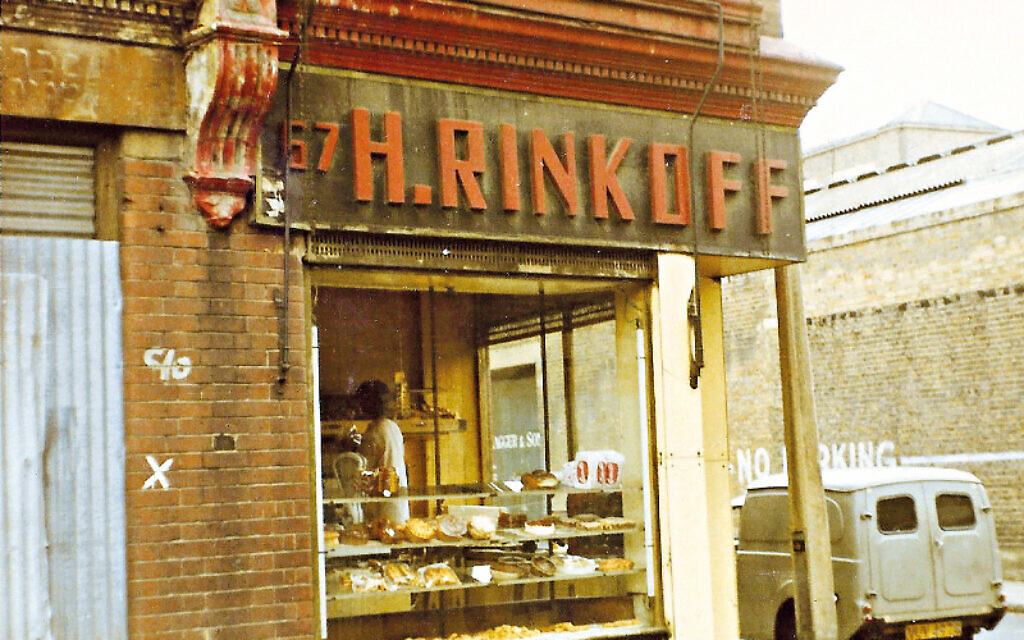The loves and loaves of Rinkoffs
We discover how four generations have earned their crust managing the last Jewish family-run bakery in the East End
Rinkoffs is one of those great Jewish migrant success stories. A family-run bakery, its very name conjures up mouth-watering memories of handmade Danish pastries, rye and challah bread, platzels, cheesecake and more.
With the fourth generation now on board, the business continues to thrive more than 100 years after its founding.
The store’s fascinating history begins with 18-year-old Hyman Rinkoff, who fled pogroms in his native Odessa and was smuggled into Germany before embarking on a long trek in freezing conditions, finally arriving in London’s East End in 1906.
Get The Jewish News Daily Edition by email and never miss our top stories Free Sign Up
But life was not exactly easy once he arrived on England’s shores.
Having trained as a baker, Hyman became a journeyman, or jobbing baker, working up to 18 hours a day, in unsanitary conditions with no ventilation. One historian describes the East End at that time as a place of “barbarism, poverty and vice”.
In her new book, Pam Fox, author of History in the Baking: The Rinkoff Story, also details how the continued arrival of Jews was seen by some as
a social crisis during the early 20th century.
For Hyman, hard work and punishing hours paid off. By the age of 25, he had scraped enough money together to establish his own bakery in
Old Montague Street, Whitechapel, with the doors opening in 1911.
Two years earlier, he had married Fanny Cohen and the couple had seven children. Traditional Yiddish-speaking Jews, they became prominent members of the Princelet Street synagogue.
After Hyman and Fanny’s death, the business passed to their children and in 1955 Max and his brother-in-law Jack Kaye entered into a partnership, buying out the other siblings.
The business expanded and, alongside the speciality breads for which it became known, Max and his wife Sylvie began selling cakes and pastries.
Bakery life was “unremitting hard work”, explains Fox, with the family all living above the shop and working in it. But the East End’s Jewish community was tightly-knit, and the shop would have been a sanctuary to immigrants yearning for home and as a place of social contact.
It has remained so ever since, says Esther Rinkoff, 63, wife of Max and Sylvie’s youngest son, Ray, and the current master baker who began working for the family in 1969.
“Going into the bakery is like a therapy session,” laughs Esther, who used to help out in the shop and now gives guided walks focusing on the bakery’s history.
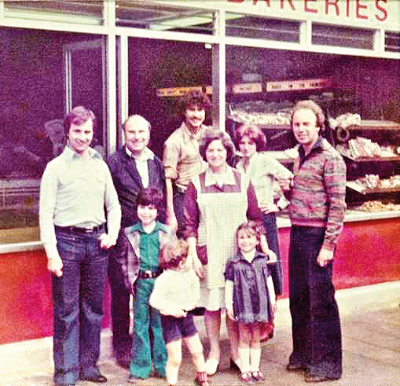
“People would come in on a Sunday and stand there for hours and chat. You would know what was going on in the community – if people didn’t come in, you knew something was wrong.”
She jokes that Ray, now 66, is an unofficial social worker, delivering goods to customers too frail to pop in, and taking home others who can’t manage the journey.
While the job has become easier over the years thanks to technical advances, it is still tough, with long days and very early starts, but Ray’s passion for what he does is visceral.
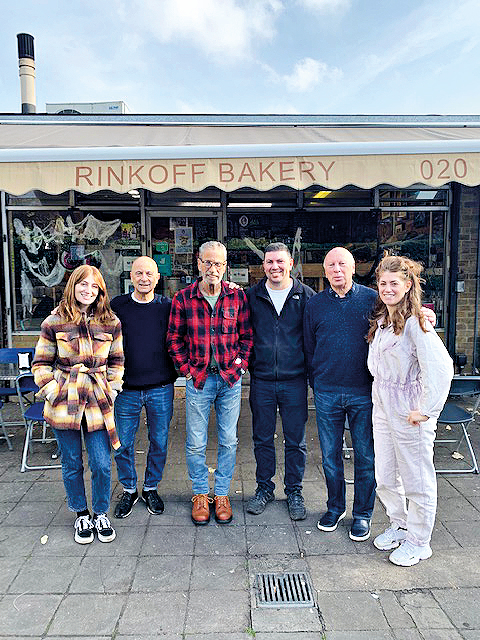
“I love that the Rinkoffs have served the community for 108 years,” he says. His brothers Harvey and Derek have since joined the firm, which occupies two sites in Vallance Road and Jubilee Street. “I have always enjoyed coming to work, and still do after more than 50 years.”
Pam, a social historian, was intrigued as to why the bakery endured. She conducted genealogical research to find out more about the Rinkoffs and read widely on the East End, but the majority of the book’s material was derived from speaking to family members, former and current bakery staff and, of course, the loyal legion of customers.
“Esther’s enthusiasm was infectious, and after I visited the bakery I was smitten,” she says.
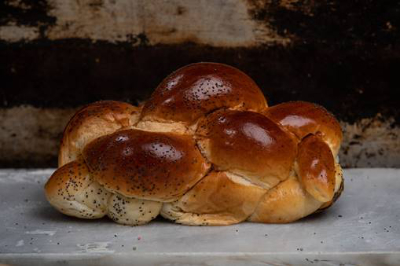
Esther explains: “We are so passionate about the business; it’s been our livelihood and we serve the community.”
In many ways, Rinkoffs is part of the social fabric of the East End. It features prominently in Steven Berkoff’s play Sit and Shiver, while a scene in Disobedience, starring Rachel Weisz, was shot in the Vallance Road shop.
Although the area has gentrified, pockets of poverty remain. Since most of the bakery’s Jewish clientele moved to greener pastures, friends have suggested the Rinkoffs move north. But Esther says firmly: “The East End is where we belong.”
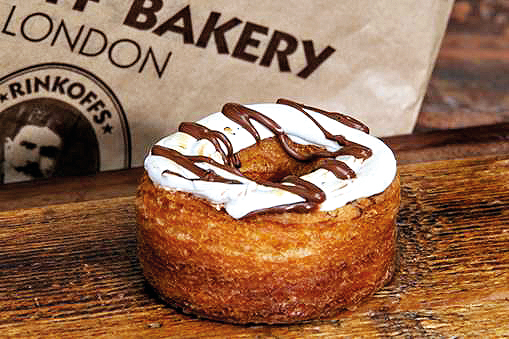
Over the last century, changing trends mean that rye, platzels and baigels now jostle for shelf space alongside Linzer biscuits, cupcakes and crodoughs (a croissant-doughnut combo), while the shop now retains the skills of the family’s fourth generation.
They include Ray and Esther’s daughters, Jennifer and Debs, as well as Derek’s son, Lloyd, all of whom have made their mark.
“I hope our children and their children will continue in the tradition and keep the Rinkoff name going for at least another 100 years,” says Ray. Hyman would no doubt agree.
- History in the Baking: The Rinkoff Story by Pam Fox is available to buy at the Rinkoff shops, on Amazon and eBay, priced £12, www.rinkoffbakery.co.uk. Details about Esther’s guided walks are at @walktalkbake on Instagram and Facebook

Thank you for helping to make Jewish News the leading source of news and opinion for the UK Jewish community. Today we're asking for your invaluable help to continue putting our community first in everything we do.
For as little as £5 a month you can help sustain the vital work we do in celebrating and standing up for Jewish life in Britain.
Jewish News holds our community together and keeps us connected. Like a synagogue, it’s where people turn to feel part of something bigger. It also proudly shows the rest of Britain the vibrancy and rich culture of modern Jewish life.
You can make a quick and easy one-off or monthly contribution of £5, £10, £20 or any other sum you’re comfortable with.
100% of your donation will help us continue celebrating our community, in all its dynamic diversity...
Engaging
Being a community platform means so much more than producing a newspaper and website. One of our proudest roles is media partnering with our invaluable charities to amplify the outstanding work they do to help us all.
Celebrating
There’s no shortage of oys in the world but Jewish News takes every opportunity to celebrate the joys too, through projects like Night of Heroes, 40 Under 40 and other compelling countdowns that make the community kvell with pride.
Pioneering
In the first collaboration between media outlets from different faiths, Jewish News worked with British Muslim TV and Church Times to produce a list of young activists leading the way on interfaith understanding.
Campaigning
Royal Mail issued a stamp honouring Holocaust hero Sir Nicholas Winton after a Jewish News campaign attracted more than 100,000 backers. Jewish Newsalso produces special editions of the paper highlighting pressing issues including mental health and Holocaust remembrance.
Easy access
In an age when news is readily accessible, Jewish News provides high-quality content free online and offline, removing any financial barriers to connecting people.
Voice of our community to wider society
The Jewish News team regularly appears on TV, radio and on the pages of the national press to comment on stories about the Jewish community. Easy access to the paper on the streets of London also means Jewish News provides an invaluable window into the community for the country at large.
We hope you agree all this is worth preserving.
-
By Brigit Grant
-
By Laurent Vaughan - Senior Associate (Bishop & Sewell Solicitors)
-
By Laurent Vaughan - Senior Associate (Bishop & Sewell Solicitors)
-
By Laurent Vaughan - Senior Associate (Bishop & Sewell Solicitors)
-
By Laurent Vaughan - Senior Associate (Bishop & Sewell Solicitors)


